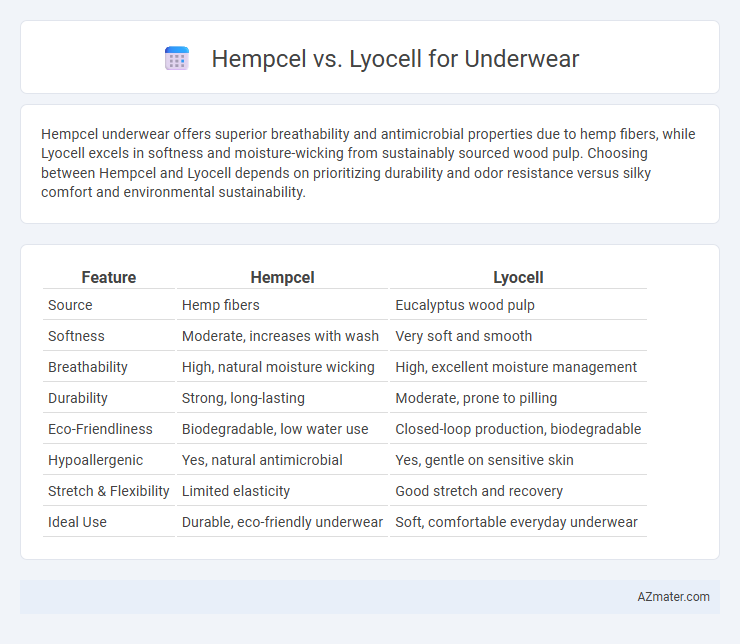Hempcel underwear offers superior breathability and antimicrobial properties due to hemp fibers, while Lyocell excels in softness and moisture-wicking from sustainably sourced wood pulp. Choosing between Hempcel and Lyocell depends on prioritizing durability and odor resistance versus silky comfort and environmental sustainability.
Table of Comparison
| Feature | Hempcel | Lyocell |
|---|---|---|
| Source | Hemp fibers | Eucalyptus wood pulp |
| Softness | Moderate, increases with wash | Very soft and smooth |
| Breathability | High, natural moisture wicking | High, excellent moisture management |
| Durability | Strong, long-lasting | Moderate, prone to pilling |
| Eco-Friendliness | Biodegradable, low water use | Closed-loop production, biodegradable |
| Hypoallergenic | Yes, natural antimicrobial | Yes, gentle on sensitive skin |
| Stretch & Flexibility | Limited elasticity | Good stretch and recovery |
| Ideal Use | Durable, eco-friendly underwear | Soft, comfortable everyday underwear |
Introduction to Sustainable Underwear Fabrics
Hempcel and Lyocell are two leading sustainable fabrics transforming the underwear market by offering eco-friendly alternatives to traditional materials. Hempcel, derived from hemp fibers, boasts durability, breathability, and natural antimicrobial properties, making it ideal for sensitive skin and reducing odor. Lyocell, produced from sustainably sourced wood pulp through a closed-loop process, provides a soft, moisture-wicking, and biodegradable option that supports responsible forestry and lower environmental impact.
What Is Hempcel?
Hempcel is an innovative textile fiber made from 100% sustainable hemp cellulose, offering exceptional breathability, moisture-wicking, and durability ideal for underwear. Unlike lyocell, which is produced from wood pulp primarily from eucalyptus trees through a closed-loop process, Hempcel emphasizes eco-friendliness with minimal chemical use and faster cultivation growth rates. This organic hemp-derived fabric provides superior antimicrobial properties and UV resistance, making it a high-performance choice for eco-conscious underwear consumers.
What Is Lyocell?
Lyocell is a sustainable fiber made from wood pulp, primarily sourced from eucalyptus, beech, and spruce trees, known for its eco-friendly closed-loop production process that recycles water and solvents. This fabric is highly breathable, moisture-wicking, and soft, making it ideal for underwear that demands comfort and durability. Compared to Hempcel, Lyocell offers a smoother texture and superior fabric drape while maintaining strong antimicrobial properties and biodegradability.
Environmental Impact: Hempcel vs Lyocell
Hempcel and Lyocell both offer sustainable options for underwear, but Hempcel has a lower environmental impact due to hemp's minimal water usage, rapid growth, and natural pest resistance, reducing the need for harmful pesticides. Lyocell, derived from sustainably harvested eucalyptus trees, employs a closed-loop process that recycles water and solvents, significantly reducing chemical waste compared to conventional textiles. Both fibers promote eco-friendly production, but Hempcel's agricultural benefits combined with Lyocell's efficient manufacturing highlight key differences in their overall environmental footprints.
Comfort and Softness Compared
Hempcel underwear offers exceptional breathability and moisture-wicking properties, making it highly comfortable for all-day wear. Lyocell fabric is renowned for its silky softness and smooth texture, providing a gentle feel against the skin. When comparing comfort and softness, Lyocell generally feels softer, while Hempcel delivers superior durability and natural antimicrobial benefits.
Moisture-Wicking and Breathability
Hempcel fabric offers superior moisture-wicking capabilities due to its natural hollow fibers that efficiently draw sweat away from the skin, enhancing dry comfort in underwear. Lyocell, derived from wood pulp, excels in breathability with its smooth, porous structure that promotes excellent airflow and temperature regulation. When choosing underwear, Hempcel provides durable, antimicrobial moisture management, while Lyocell ensures soft, breathable wear with high moisture absorption and quick drying properties.
Durability and Longevity
Hempcel underwear exhibits superior durability compared to Lyocell due to its strong natural fibers that resist wear and tear over extended use. The longevity of Hempcel products is enhanced by their resistance to pilling and stretching, maintaining shape and comfort after multiple washes. Lyocell, while soft and breathable, tends to be less resilient under frequent friction and heavy usage, leading to faster fiber breakdown and reduced garment lifespan.
Skin Sensitivity and Hypoallergenic Properties
Hempcel underwear offers superior skin sensitivity benefits due to its natural antimicrobial properties and breathability, reducing irritation and moisture buildup. Lyocell fabric, derived from eucalyptus trees, is highly hypoallergenic and gentle on sensitive skin, with excellent moisture-wicking abilities that prevent bacterial growth. Both materials are ideal for individuals with sensitive skin, but Hempcel excels in durability and odor resistance while Lyocell provides a softer, smoother texture.
Price and Availability
Hempcel underwear offers a sustainable option typically priced moderately, reflecting its eco-friendly cultivation and processing methods, but availability can be limited due to lower production scale and niche market focus. Lyocell underwear, often more widely available in mainstream retail outlets, tends to have a broader price range influenced by brand and fabric blend variations, with higher-end options priced above hemp-based garments. Consumers seeking affordable, widely accessible underwear may prefer lyocell, while those prioritizing sustainability might accept limited availability and slightly higher costs associated with hempcel products.
Final Verdict: Choosing the Best Fabric for Underwear
Hempcel offers superior durability, breathability, and natural antimicrobial properties, making it ideal for sustainable and long-lasting underwear. Lyocell stands out for its silky softness, moisture-wicking ability, and eco-friendly production process, providing exceptional comfort for sensitive skin. Choosing between Hempcel and Lyocell depends on whether durability and odor resistance or softness and moisture management are your primary underwear priorities.

Infographic: Hempcel vs Lyocell for Underwear
 azmater.com
azmater.com